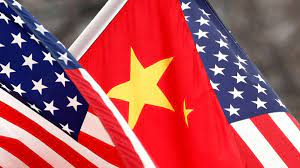NEW YORK, Aug. 6 (Xinhua) — Cutting off U.S.-China academic engagement will prove detrimental to the long term interests of the United States, an American professor and administrator has said.

“I believe that the restrictive policies being followed by many U.S. universities such as UNC are wrongly oriented and will prove detrimental to the long term interests of the United States,” said Denis Simon a week after resigning from his post as a clinical professor of Global Business and Technology, Kenan-Flagler Business School, University of North Carolina at Chapel Hill (UNC).
“The U.S. needs China and China needs the U.S. We may not like the idea of such intense interdependence, but the fact remains that China’s rise is a reality that our country must learn to deal with,” he told Xinhua in an interview.
While China’s rise may be viewed as a so-called “existential threat” to the U.S. by many in the world of the Beltway, the fact is that China’s enhanced capabilities in science, technology and education represent “an exciting opportunity for real mutual benefit from enhanced interactions and cooperation,” said Simon, who had served as Executive Vice Chancellor at Duke Kunshan University in China from 2016 to 2020.
“By cutting off engagement with China, American academics are in danger of losing access to the world’s number two economy and the second largest spender on R&D across the globe,” he said.
Moreover, “by creating distance between our two countries, we also are putting at risk the future of our talent pipeline, which is severely in need of high end talent from China to join our graduate programs and eventually secure employment in those fields where the U.S. hopes to maintain a strategic competitive advantage,” he said.
Simon noted that the environment on many American university campuses regarding China already has been poisoned by the so-called “China Initiative,” a program run under the Department of Justice (DOJ) and the FBI to weed out alleged “spies” among the U.S. academic community.
However, the program was terminated because, among those persons being prosecuted, there was insufficient or no evidence to move ahead with the majority of the cases; except in a few isolated instances, most of the charges were dropped.
After a huge outcry from across many universities and the Asian American community in the United States, the DOJ was forced to shut down the program.
“Though the China Initiative may no longer exist, there are suggestions unfortunately that parts of the investigative aspects of the original program remain in place,” Simon said.
He suggested that instead of running scared about potential federal government funding cutoffs and Congressional criticisms, U.S. universities should be the bastion of a new vision for cross-border collaboration and cooperation.
Simon, who has spent four decades working to build bridges of understanding and cooperation between the U.S. and China, perceived the current interventions into university academic affairs as “a fundamental threat to academic freedom.”
“Even more importantly, unlike in the past when relations in the sphere of education and research were highly unequal and asymmetrical, the situation is 180 degrees different today,” he said.
In 1978-79, when the U.S. and China signed the original umbrella agreements to facilitate cooperation in science and technology as well as education, “most of the issues that dominate the current bilateral agenda were not considered critical with China so far behind the U.S. in most fields that no one imagined China catching up to the U.S. any time soon,” he said.
The answer to China’s rapid development “is not to be found in delinking, but in exploring new and better ways our universities, think tanks, research centers and corporations can more effectively work together to arrive at win-win, mutually beneficial solutions,” he said.
At a time when great mistrust exists between the two countries, it is more important than ever for the two sides to maintain active communications and dialogue. Otherwise, the downward spiral will get even worse and the possibility of mending fences in the future will become much more difficult, Simon noted.
He advocated taking “a unified stand against the current series of misinformed policies that are akin to watching us drive off a cliff even as we see the edge right in front of us.”